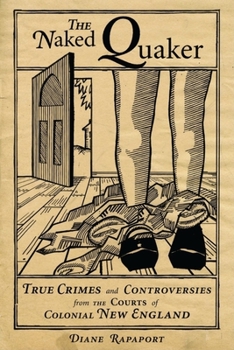The Naked Quaker: True Crimes and Controversies from the Courts of Colonial New England
Select Format
Select Condition 
Book Overview
On court days in colonial New England, folks gathered from miles around to listen as local magistrates convened to hear cases. In the abundant records extant from these hearings, we experience the passions and concerns of ordinary people, often in their own words, more than three centuries after the emotion-charged events that brought them to court. Rapaport is a lawyer and historian who, by drawing on these court records, has created an award-winning...
Format:Paperback
Language:English
ISBN:1933212969
ISBN13:9781933212968
Release Date:September 2007
Publisher:Commonwealth Editions
Length:160 Pages
Weight:0.56 lbs.
Dimensions:0.5" x 6.0" x 8.9"
Customer Reviews
3 ratings
A wider audience can now appreciate these lively vignettes of early crime.
Published by Thriftbooks.com User , 17 years ago
Collections strong in regional American history - particularly New England regional history - will want to add THE NAKED QUAKER: TRUE CRIMES AND CONTROVERSIES FROM THE COURTS OF COLONIAL NEW ENGLAND to the collection. It comes from a historian and former trial lawyer who uses court records to provide over twenty true stories previously published in his column for New England Ancestors journal. A wider audience can now appreciate these lively vignettes of early crime. Diane C. Donovan California Bookwatch
Naked Quaker reveals history
Published by Thriftbooks.com User , 17 years ago
Whoever still thinks history is boring probably hasn't been paying attention - and certainly hasn't read Diane Rapaport's The Naked Quaker: True Crimes and Controversies from the Courts of Colonial New England (Commonwealth Editions). Since human history is largely a by-product of human nature, court dockets are bound to be filled with intriguing goings-on in any era. In this collection we encounter community leaders like Thomas Danforth dealing with neighborhood squabbles (that could escalate to witchcraft charges); neighbors from Hell (like Bacon the pig thief); and humble folk who might otherwise never have been recorded at all (like enslaved Sylvanus Warro fighting for his freedom). Endnotes provide the scholarly basis for the tales which cast an uncommon light on a frequently stereotyped part of our nation's past. The stories themselves provide a darned good read. Marilynne K. Roach author of The Salem Witch Trials: a Day-by-Day Chronicle of a Community Under Siege The Salem Witch Trials: A Day-by-Day Chronicle of a Community Under Siege
The seventeenth century -- ready for prime time
Published by Thriftbooks.com User , 17 years ago
Who'd imagine that a little book about court cases in seventeenth century New England could be so completely enchanting? Yes, this little volume is the product of historical research. Diane Rapaport, a trial lawyer-turned-storyteller, combed through paper archives, microfilm, and other archival sources to collect these real-life tales. Her magic touch turns them into a quirky, irresistible read. Rapaport's twenty-five tales are grouped by subject, and you won't know which chapter to turn to first, since part of the fun is in her titles. Chapter 1, Witches and Wild Women, gives us "The Witch at the Top of the Stairs" -- a bad-neighbor situation that blew out of proportion and ended up in court. Chapter 2, Coupling, includes "The Scottish Rogue" and "The Wandering Wife" -- two sleazy tales that would fit right into prime time if you put them in modern dress. Other stories you'll read with relish are "The Purloined Pigs" (in which the aptly named Michael Bacon lets his hogs run wild); "To Drive Away Melancholy" (a young couple fall afoul of the law by hosting sinful card games in their remote cabin); and "Drinking With The Drummer" (the town drummer tops up his four-pound salary with bootlegging). The title story, "The Naked Quaker," leads with the details of Lydia Wardell's 1663 protest in Newbury, Massachusetts. Lydia and the rest of the Massachusetts Quakers were persecuted and penalized, and sometimes banished or even executed. Attendance at the Puritan Sabbath services was mandatory, and Lydia chose to protest by taking off her clothes. This form of protest, according to the author, was "popular among dissenting Quakers ... in 1650's England, as a way to symbolize the spiritual nakedness of their persecutors." Lydia "was ordered to be severely whipped" and soon after this punishment she and her husband relocated to the more tolerant New Jersey wilderness. For all its entertainment value, this book is a serious piece of historical research that provides a wealth of insight into the past. It's our good luck that Diane Rapaport has the talent to create such a readable little book out of it all. Highly recommended!





